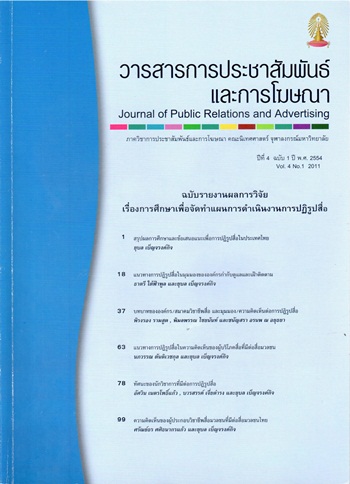แนวทางการปฏิรูปสื่อในความคิดเห็นของผู้บริโภคสื่อที่มีต่อสื่อมวลชน
Main Article Content
Abstract
The purposes of this study are to investigate the media consumption of media consumers, to examine the media consumers’ opinions toward the Thai mass media, and to explore the expectations of media consumers toward the Thai mass media under normal circumstances and high-conflict circumstances. McQuail’s (2005) Normative Theory of Media was adopted as the framework. In addition, media issue unique to the Thai situational context at the time were included. The adapted normative media framework comprises of 3 dimensions: media structure and operations, media’s concern for public interests, and media’s concern for avoiding harm to the public and the society. the research employed quantitative methodology. The population for this study are media consumers who are Thais nationwide. A multi-stage cluster sampling comprising of probability sampling and non-probability sampling were used. The data was collected crosssectionally during August - October 2010 using questionnaire surveys as instruments. A total of 3,410 Thai respondents from 6 regions and the Bangkok Metropolitan area who were mainly media consumers and online respondents who utilized new media were asked to complete the offline and online questionnaires.
The results indicated that television, family members and search engines are the media that Thais mostly utilize when seeking for information. On the other hand, local media namely community radio, local cable television, and bulletin boards are the media that Thais least rely on when seeking for information. Also media most exposed tended to be the media that consumers reported higher level of credibility than the least one. Thais from different regions, offline media consumers, and online media consumers exhibited differences in their opinions toward media credibility. Generally, Thais rated the Thai mass media higher on the media’s concern for public interests dimension; lower on the media structure and operations dimension; lowest on the media’s concern for avoiding harm to the public and the society dimension. Under normal circumstances, Thais have higher expectations toward the Thai mass media on the media structure and operations dimension; lower expectations on the media’s concern for avoiding harm to the public and the society dimension; lowest expectations on media's concern for public interests dimension. A mean comparison between Thais' opinions and expectations toward the Thai mass media under normal circumstances revealed significant differences on all three dimensions. Moreover, a mean comparison between Thais' expectations toward the Thai mass media under normal circumstances and high-conflict circumstances revealed significant differences on all items. In general, the Thais’ expectations toward the Thai mass media under high-conflict circumstances are higher compared to expectations under normal circumstances. Under high-conflict circumstances, Thais have higher expectations toward the Thai mass media on the media structure and operations dimension; lower expectations on the media’s concern for avoiding harm to the public and the society dimension; lowest expectations on media’s concern for public interests dimension.


